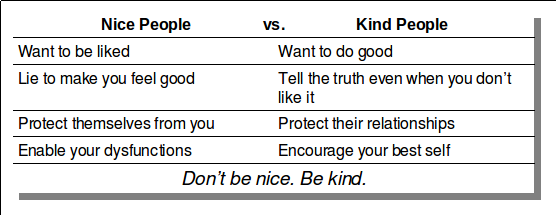… love is kind. 1 Corinthians 13:4
If you’re like me, you’ve seen memes on Facebook declaring that “kindness costs nothing.” But of course kindness is often costly. Kindness requires that you have another person’s best interests in mind rather than their approval or admiration. The question is, “What is good for this person?” not “How can I get this person to like me?” Love is careful not to assume it knows what is best for another. That’s why patience—allowing others to make their own choices—has to come first. But kindness cares more for the well-being of the beloved than for their friendship or attachment. So kindness may, in fact, do things that the beloved perceives as unkind—at least in the moment.
We see this dynamic best in the way parents discipline their children. Keeping in view the well-being of the child, they may forbid activities that could seriously endanger the child—activities such as playing in the street or starting fires or throwing knives. The child may perceive the parent as unkind, but in fact the parent is showing genuine love and kindness for the child by preventing them doing something dangerous.
What about friendships, however, where the relationship does not include the unequal power dynamics of parent and child? Can kindness still be perceived as unkind? Of course it can. For example, you might warn your friend against making a risky investment, even though pundits and economists are describing it as safe. Or you might do all you can to dissuade a friend from committing to a relationship that you and other friends can see is plainly doomed. Or you might advise your friend that he endangers his own soul by continuing unrepentant in sin.
Kindness extends beyond mere warnings or advice, however. You might attend a protest for racial equality but find that people of color regard your advocacy as officious or patronizing because you are white. Kindness makes sacrifices for the good of the beloved, including bearing their recriminations, their misunderstandings, and even their hatred. This is the way God treats us, and he expects us to treat others the same way. This does not mean that you become a doormat and simply accept the ill treatment of others. But it does mean that you might withhold the exercise of your power and choose to appear weak rather than endanger the good that will come of doing what you know is right.
Kindness offers help but does not insist that its offer be accepted. Remember that Paul is describing love, which is always other-centered, never self-centered. Love must start with patience. You must respect the autonomy of those you love. Yes, it feels good to be needed, but as soon as something feels good, it becomes a temptation. Beware the seductive power of what feels good! Helping so you can feel good is not kind or loving. As Anne Lamott says, “Help is the sunny side of control.” If we ignore the autonomy of those we love, we risk creating a codependent relationship punctuated by continuing failures and rescues. Indeed, if we ignore their autonomy, our love will come to look an awful lot like hatred, and our sense of being in control will become increasingly unsatisfying. True kindness leaves the ones we love in control. They determine what help they will accept and how they will use it. Of course, this does not mean simply enabling them to do as they please. The offer of help may come with conditions, and there may be milestones that must be reached for help to continue. The goal of help offered in kindness is independence not dependence.


